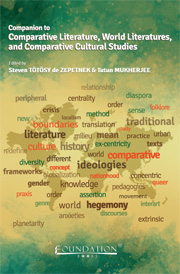Book contents
- Frontmatter
- Contents
- Introduction to the Companion to Comparative Literature, World Literatures, and Comparative Cultural Studies
- PART 1 Theories of Comparative Literature, World Literatures, and Comparative Cultural Studies
- The Contextual Study of Literature and Culture, Globalization, and Digital Humanities
- Comparative Literature and Ex-centricity
- Possibilities and Limits of Comparative Literature Today
- Comparative Cultural Studies and Pedagogy
- Teaching World Literatures
- Comparative Literature and the History of Literature
- Meltzl de Lomnitz, Comparative Literature, and Philosophy
- Comparative Cultural Studies and Cultural Anthropology
- Comparative Literature and Interart Studies
- Gender and Genre in Comparative Literature and (Comparative) Cultural Studies
- Comparative Cultural Studies and Translation Studies
- Comparative Cultural Studies and the Study of Medieval Literature
- Comparative Cultural Studies and Linguistic Hybridities in Literature
- Comparison and Postcoloniality
- (Inter)mediality and the Study of Literature
- PART 2 Comparative Literature in World Languages
- PART 3 Examples of New Work in Comparative Literature, World Literatures, and Comparative Cultural Studies
- PART 4 Multilingual Bibliography of Books in Comparative Literature, World Literatures, and Comparative Cultural Studies
- Index
Comparative Cultural Studies and the Study of Medieval Literature
from PART 1 - Theories of Comparative Literature, World Literatures, and Comparative Cultural Studies
Published online by Cambridge University Press: 05 April 2014
- Frontmatter
- Contents
- Introduction to the Companion to Comparative Literature, World Literatures, and Comparative Cultural Studies
- PART 1 Theories of Comparative Literature, World Literatures, and Comparative Cultural Studies
- The Contextual Study of Literature and Culture, Globalization, and Digital Humanities
- Comparative Literature and Ex-centricity
- Possibilities and Limits of Comparative Literature Today
- Comparative Cultural Studies and Pedagogy
- Teaching World Literatures
- Comparative Literature and the History of Literature
- Meltzl de Lomnitz, Comparative Literature, and Philosophy
- Comparative Cultural Studies and Cultural Anthropology
- Comparative Literature and Interart Studies
- Gender and Genre in Comparative Literature and (Comparative) Cultural Studies
- Comparative Cultural Studies and Translation Studies
- Comparative Cultural Studies and the Study of Medieval Literature
- Comparative Cultural Studies and Linguistic Hybridities in Literature
- Comparison and Postcoloniality
- (Inter)mediality and the Study of Literature
- PART 2 Comparative Literature in World Languages
- PART 3 Examples of New Work in Comparative Literature, World Literatures, and Comparative Cultural Studies
- PART 4 Multilingual Bibliography of Books in Comparative Literature, World Literatures, and Comparative Cultural Studies
- Index
Summary
Abstract: In her article “Comparative Cultural Studies and the Study of the Medieval Literature” Roberta Capelli discusses the importance of studying medieval authors and manuscripts using a contextual and comparatist approach. She postulates that the conceptual eclecticism and empirical pragmatism of comparative cultural studies offer scholars useful theoretical and methodological parameters of analysis to understand the palimpsestic nature of medieval texts. While inter-and multidisciplinary training in the traditional fields of medieval studies (textual criticism, history, philosophy, etc.) is necessary to deal with the socio-cultural, textual, visual, etc., complexities of the medieval world, Capelli suggests that medievalists would benefit from employing new media technologies in digital humanities.
Introduction
Today, the fascination with matters medieval—in particular the Gothic—occur in all manners and genres whether literature, cinema, television, and new media including the world wide web and video games, etc., and the resurgence of medieval genres, heroes, themes, myths, and traditions are re-shaping our understanding of the Middle Ages (see, e.g., Charlesworth; Fugelso; Pearsall; Utz and Shippey; Weisl). But also the scholarly approach to the Middle Ages has been undergoing significant changes through the last century including the re-thinking and updating the theoretical and methodological bases of research in light of the new literacies and technologies.
The Middle Ages is the period of European history from the fall of the Roman empire in the West (fifth century) to the fall of the empire in the East with Constantinople in 1453.
- Type
- Chapter
- Information
- Companion to Comparative Literature, World Literatures, and Comparative Cultural Studies , pp. 162 - 177Publisher: Foundation BooksPrint publication year: 2014



